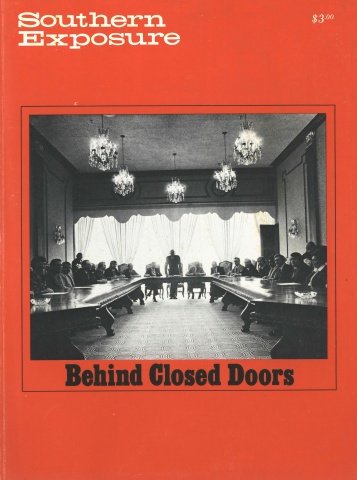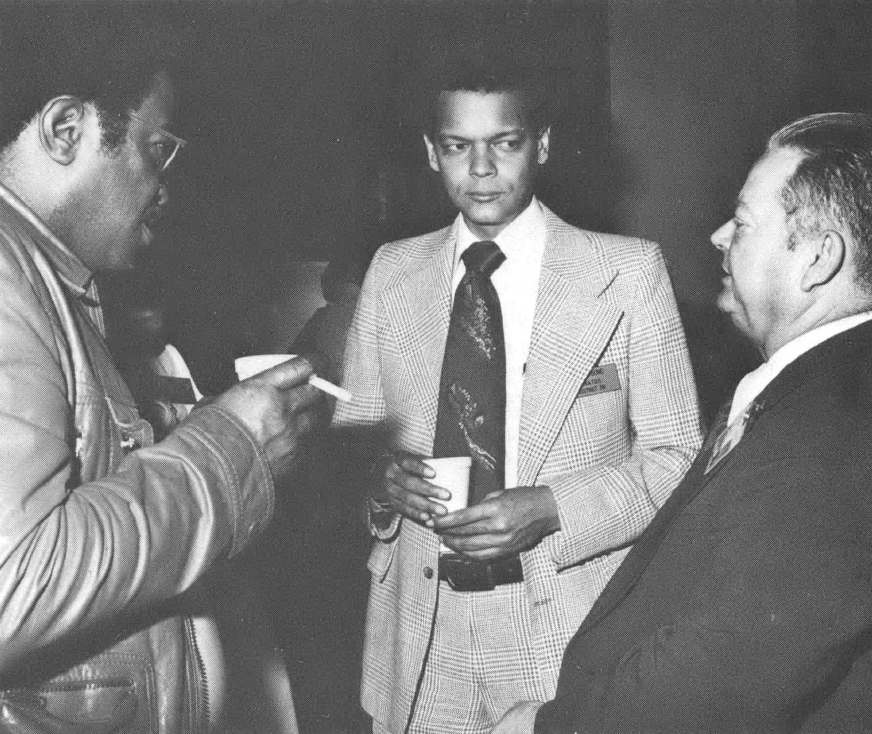
This article originally appeared in Southern Exposure Vol. 7 No. 1, "Behind Closed Doors." Find more from that issue here.
The early ’60s mass mobilizations and demonstrations did more than destroy the South’s petty apartheid; it drew the South’s black middle class into the protest movement in ways it had never been involved before. One hope of this synthesis of the educated elite with the mass action of the common man was that the newly enfranchised voters would select men and women of consummate political skill and high moral purpose to sit on the South’s councils, commissions and legislatures; that they would forge a new “New South” from the remnants of its several predecessors.
Several among the newly elected black officials took to their new offices like ducks to water. They learned the machinery that turned the engines of government. They organized caucuses on racial lines to coordinate their efforts. They learned the “go along — get along” philosophy without surrenduring independence of thought or action. They were true politicians, able representatives of their people: open, honest, effective, dutiful, responsive and responsible. If they were more moderate than some had hoped, they were more militant than others had dared wish. If they occasionally revealed that social class was a greater determinant than racial origin, they remained racial advocates, loud and frequently lonely voices speaking for the dispossessed.
But many of the region’s black elected officials have turned out to be only slightly better than the white officials whose places they took. Even though they are more “liberal” on the American political index, they remain less likely to harness the reins of government than their more experienced, more veteran white colleagues. Too often, the rank and file of black elected officials (BEOs) are as concerned with narrow, neighborhood issues as any alderman in Chicago. They are surely less venal than Chicago’s pols are reputed to be, but because they depend more on personality and less on organization to get elected, the South’s BEOs are largely charismatic figures sitting on the outskirts of power.
At the same time the number of BEOs increased, the number of blacks actually voting began to go down, almost as if the latter had seen enough of the former. In 1976, in the election guaranteed for Jimmy Carter by black ballots in 13 states delivering 216 of the 270 electoral votes he needed to win, only 58.5 percent of eligible black voters registered and only 48.7 percent actually voted. (For whites, the rates were 68.3 percent registered and 60.9 percent voting). The 1976 voting and registration figures for blacks were the same as in 1972, but lower — by six percentage points — than in 1968 and 1964.
53 percent of eligible black voters live in the South; in 1976, only 56.4 percent were registered and 46 percent actually voted. Because of population densities, the South has elected more blacks to public office than any other region, but these mayors and aldermen and commissioners often remain accessories beside the fact of actual governance of their towns, counties and states.
Former Governor Lester Maddox’s prescription for improving his state’s penal system is apt here — ‘‘We need a better class of criminals.” Southern blacks need a larger pool of more sophisticated voters, less likely to vote for a man or woman who knows the words to their hymns rather than the numbers on their paychecks, and a larger pool of potential officeholders, more familiar with multi-million dollar budgets than with church collections and tenant association dues. This does not mean that the minister or the community club president are disqualified from public service, but that charisma and a minute constituency aren’t enough, by themselves, to guarantee voters a return on their investment of their franchise.
First, the voters. The Atlanta-based Voter Education Project, nearly abandoned by the New York foundations that created it, remains the single agency devoted solely to registration of minority voters across the South. This organization must be strengthened and returned to its former role as comptroller and dispenser of funds for its various, locally (often neighborhood) based constituent groups that actually do the hard work of registering the unwilling.
But the VEP must begin to wean itself away from dependence on remote sources for funds, and its clients from their sole reliance on the VEP itself. A system of demanding matching funds from client groups would not only double the amount of available monies, but would begin to teach the self-reliance so important as all sources of outside funds, from public and private sources alike, diminish.
For itself, the VEP must raise capital increasingly from those who’ve already benefited from its work — the growing black middle class attracted back to the South by jobs won by the political and street activism of the middle and late ’60s. This last task is far from easy; the venerable NAACP, now more than 60 years old, has never been able to position itself as the fiscal responsibility of America’s black population, despite its long record of success.
In addition to the relatively simple — in most of the South — registration process itself, the VEP must use its scarce resources to teach political organization, a throwback technique to the late ’50s when the South’s few black voters in urban areas — Atlanta, Charlotte, Charleston, Birmingham — were organized by nonpartisan Voters and Civics Leagues. By avoiding partisan politics, and by organizing upward from block to precinct to ward, these early Leagues were able to maximize the minority vote far beyond its actual percentage in the voting population. They could deliver 85 percent of minority votes to endorsed candidates; their endorsements, colored by the racial tones of the times, often selected the least offensive candidate, but were able to moderate the Negrophobes so common in the ’50s South. Partisan politics, neighborhood parochialism and the increase in personality-oriented duchys have destroyed most Voters Leagues; their descendants, like New Orleans’ SOUL and COUP described by Tom Dent, have been destroyed by rewards to their leadership or the inevitable personal struggles for power engendered by political activism.
Coupled with organization must come citizenship education; if literate, white American college students don’t know the basic rudiments of citizenship, or the names and terms of their federal representatives, how can poorly educated Southern blacks be expected to?
The importance of bond elections, of Public Service Commissions and other regulatory agencies, the budget-setting process in the legislature, the limits of mayoral power, the supremacy of county over municipal government, the spread of regionalism in health planning particularly and all planning generally, must be explained to a populace which views its officeholders as simply ombudsmen divorced from elective function, refereeing between a formless, faceless government and the citizen.
Registration, organization and education must be conducted at equal speed by the large national rights organizations — the NAACP and SCLC throughout the South and the Urban League in cities where it exists — as well as by the thousands of community groups that abound. A revitalized Voter Education Project can serve as the funding source, as the fount of expertise in organizational techniques and as the coordinator of training for the BEOs themselves.
It is impossible to pre-select officeholders, or to ensure that Candidate A who knows the limits of his job and its beneficial uses for his constituents will be elected over Candidate B who is looking - as one black Atlanta County Commission candidate admitted — for the job with the best pay and the most benefits. But it isn’t impossible to tutor some of the winners.
A variety of organizations — most now defunct - have tried to systematize the training process, but none has ever institutionalized it. Nevertheless, exposure to the larger world of finance and budgeting is as essential as is a strong commitment to equal justice in officeholders of any race or position; for minority lawmakers, it is obligatory.
In January, February and March, the Joint Center for Political Studies, a foundation-funded “research, education, technical assistance and information” agency for minority officials, will host three training institutes supported by the US Civil Service Commission. Focusing on budgeting, planning and management, the seminars will teach their participants to “read a budget, apply for federal and state assistance,” and will instruct elected and appointed officials in ‘‘time management, increasing personal effectiveness, bond issues,” and ‘‘the constitutional duties of elected officials.” It should be no surprise that officeholders need instruction in their duties; what is surprising is that we accept and re-elect those who so obviously lack expertise.
The Joint Center’s seminars are also making use of a resource virtually untapped by the South’s political activists — the black college. Two of the three meetings will be held at Jackson State College in Jackson, Mississippi (January), and at South Carolina State College in Orangeburg (February). While political science departments at the more than 100 public and private black schools have played a marginal role in guiding the course of black politics, these schools’ economics and business departments have had little to do with training or support of often unsophisticated BEOs. These colleges, under attack from HEW, forced to adapt to new curricula and abandon old ones to meet integration guidelines, their very existence questioned by cost-conscious and racist state governments, could do worse than to undertake citizenship education and job-training for the new crop of BEOs, community activists and the small but growing number of black bureaucrats in the South.
The political process remains the surest path to economic advancement and democratic decision-making for the South’s underclass, white and black; the present state and low numbers and skills of minority elected officials can only reinforce the inequities of the latest New South unless radical shifts occur in the knowledge and number of voters and candidates.
The correct mix of alert and informed electorate, compassionate and skilled officeholder is difficult to stage-manage, but it has failed to develop naturally. Those who care about the region and its people, their ability to share democratically its wealth and resources, must see political development as the first priority of social activism from now on.
The leaders of voting drives and candidates for public office in the remainder of the 70s and the upcoming ’80s will have to shift their rhetoric as well. A plea for participation based on yesterday’s martyrdom is no longer sufficient to stir the unregistered — and uninterested — inhabitants of the South’s ghettos and abandoned farmlands. They have given a helping hand upward to too many status-seeking candidates who use elective office for personal aggrandizement, or who see themselves in an adversary relationship with the people who promoted them to office.
Fifteen years ago in Atlanta, a defeated candidate for political office complained that Atlanta’s black voters received nothing for their votes except “street lights on Auburn Avenue and policemen who can’t arrest anyone but you.”
The successful campaign in the 1980s must tie political participation with economic improvement, or black Americans will enter a long night of permanent political impotence and its consequent permanent penury.
Tags
Julian Bond
Julian Bond was a founder of the Institute for Southern Studies and served as its president for several years. He was the communications director of SNCC, served in the Georgia state legislature, and was a professor at the University of Virginia.

